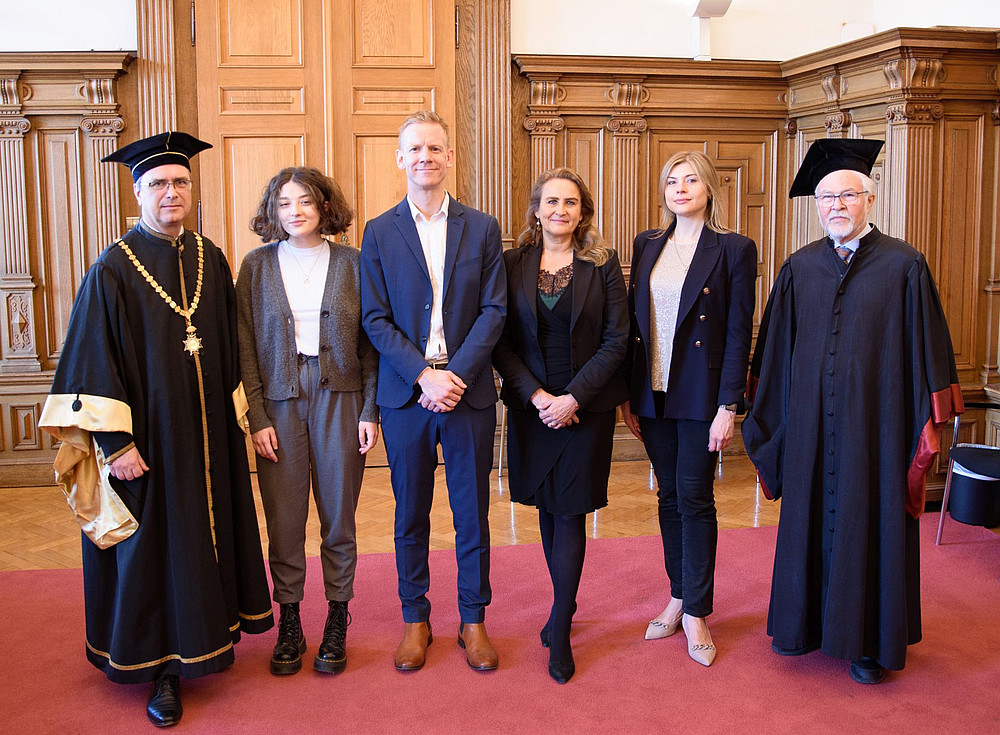Viasna receives University of Graz award for documenting human rights violations

Representatives of the University of Graz and attending organizations at the ceremony. Photo: Uni Graz/Vilgut
As part of the International Accountability Platform for Belarus, the Viasna Human Rights Center received the University of Graz Human Rights Award for its work in documenting serious human rights violations and crimes against humanity.
On March 22, 2024, the University of Graz awarded a prize in Graz, Austria, as a symbol of a free and democratic Europe. Representatives from DIGNITY - Danish Institute Against Torture, Viasna Human Rights Center, International Committee for the Investigation of Torture (Belarus), European Committee for the Prevention of Torture, Bellingcat, Truth Hounds, Human Rights Watch, and the OSCE attended the ceremony and symposium. During the ceremony, participants and attendees discussed the political persecution of Belarusians. They understood the context of what was happening. For example, when Maryia Kalesnikava was mentioned, a flute melody was played.
The focus remains on Belarus
The plenary session that followed the award ceremony covered topics such as the victim-centered approach, the application of best practices, and the use of open source materials for investigations, the Platform's uniqueness, and the potential for applying its experience in other countries. Viasna shared their experience of working with victims, which is based on respect, acceptance, and an individualized approach to all victims with whom professionals and specialists communicate during documentation. This sentiment was echoed by those in attendance.
"For the university, freedom of instruction and research is of highest importance. The values such as the freedom from unlawful persecution, freedom of expression, and the freedom to shape one's life according to one's own ideas are inseparably linked to this," said Peter Riedler, Rector of the University of Graz. "The IAPB award is an expression of this commitment and emphasizes the importance of human rights for our university."
Rasmus Grue Christensen, head of the non-governmental organization DIGNITY, which leads the IAPB, noted that this award recognizes the unique and innovative features of the IAPB:
“There are currently around 1,500 political prisoners in jail,” he said, describing the situation in Belarus. “Those who have been released from prison continue to report that they were tortured and subjected to other forms of ill-treatment. Belarusians who flee the country risk the expropriation of their property and the loss of their citizenship.”
Palina, a representative of Viasna, stated that the event focused on the increase in repressions, the conditions of detention for Belarusians in detention centers, the practice of incommunicado detention, and the persecution of Belarusians abroad. Attendees asked questions to gain a deeper understanding of the current situation in Belarus, including how to refer to Lukashenka and the potential changes if he were to leave office and how certain groups of the population are being persecuted.
“All the questions were answered in detail,” Palina noted. “Many attendees, including university students of various specialties, approached us later to ask questions and express appreciation for our work.
As one of the few individuals who directly communicates with witnesses and victims, my experience was crucial for those present. It was important for me to share the true facts of violence and repression that I hear during interviews. These facts can often drop off the radar in light of the developments in Belarus.
During my speech, I expressed gratitude for receiving the prestigious International Rights Award and spoke about our colleagues who are currently being held in detention, as well as the work of those who document violations. It was important for us to have the opportunity to discuss the path that Belarusian society is following in its struggle for democracy. I emphasized that the Belarusian people are grateful for the creation of the Platform and the solidarity of the democratic world in our fight for freedom. Achieving justice and accountability has always been a long road. We are pleased that we can now view the world from a fresh perspective and enhance the mechanisms of justice. Time should not favor those who violate human rights.”
Viasna participated in meetings with representatives and spokeswomen of the local Belarusian diaspora. They also gave an interview for the student magazine Denken + Glaube, discussing the persecution of the Catholic population in Belarus.
How does the platform work?
The Platform was established in 2021 to document human rights violations in Belarus and bring perpetrators to justice. To date, the Platform has documented approximately 2,500 reports from victims and witnesses. The context in which the Platform operates in Belarus is unique. The authorities make no effort to investigate gross human rights violations and crimes against humanity, without acknowledging them. Therefore, the Platform fills these gaps to the extent possible.
The Platform comprises two Belarusian human rights organizations that are closely involved in all events and have direct contact with Belarusians: the Viasna Human Rights Center and the International Committee for the Investigation of Torture.
The main objective of the Platform is to collect, consolidate, verify, and store information and evidence of serious human rights violations, including torture, committed in Belarus before and after the presidential election. The goal is to establish a repository or 'hub' of consolidated information and high-quality evidence from various sources. The purpose of this repository is to assist prosecutorial authorities and criminal trials in national courts, in accordance with the principle of universal jurisdiction, as well as any other relevant accountability procedures. This includes expertise from the UN on the human rights situation in Belarus, with which Viasna has excellent and close cooperation.
Viasna started collecting accounts of torture in 2020. Unfortunately, this work is still ongoing. We urge witnesses of violence to remain courageous and reach out to human rights activists.

















